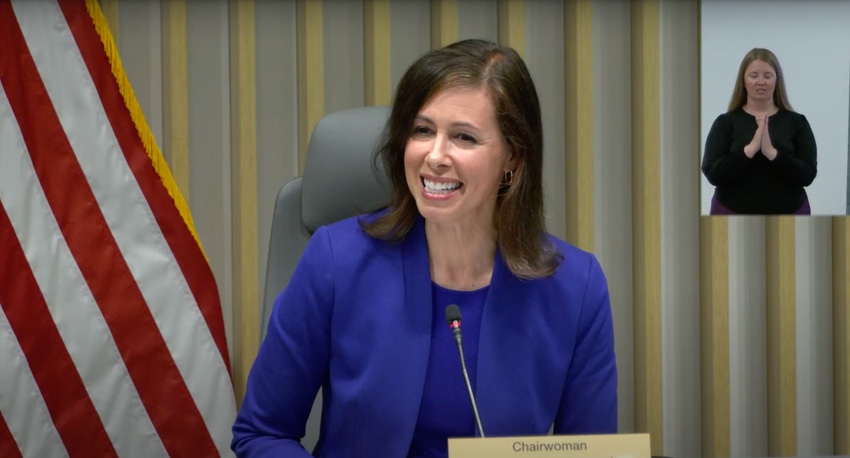FCC passes net neutrality order ... again ... for now
Democrats on the FCC voted to restore net neutrality and Title II rules. The issue will face inevitable court challenges and is likely to be undone again under the next Republican administration.

The FCC voted on Thursday along party lines to pass its order on Safeguarding and Securing the Open Internet, restoring net neutrality and reestablishing the Commission's Title II authority over broadband services. The vote was taken at the FCC's open meeting for the month of April.
Commissioners shared statements – of varying lengths – ahead of the vote.
"Broadband is now an essential service. Essential services, the ones we count on in every aspect of modern life, have some basic oversight. So let's be clear about what we are doing today. This agency, the nation's leading communications authority, believes every consumer deserves Internet access that is fast, open and fair. That is why we determine that the Federal Communications Commission should be able to assist consumers and take action when it comes to the most important communications of our time. And that's broadband. This is common sense," said FCC Chairwoman Jessica Rosenworcel.
Conversely, a vocal opponent of the order, Republican FCC Commissioner Brendan Carr offered a different take [ed. note: during a nearly 35-minute diatribe in which he somehow managed to mention Hunter Biden's laptop].
"Today's order is not about correcting a market failure. Broadband access is more vibrant and competitive than ever, no matter how you slice the reams of data," said Carr. "Will ISPs invest as intensely when the rules of the road are opaque, when business choices can be second guessed without notice, when regulators reserve the right to dictate the rate of return or when upgrades and innovations require more and more paperwork and approvals? Uncertainty riddles every aspect of this order ... I'm confident that we will right the ship, and I'm certain that the courts will overturn this unlawful power grab."
The order passed on party lines – cueing applause from the smattering of activists in the room – with the Commission's three Democrats voting in favor and two Republicans dissenting.
Industry reactions
The vote drew expected reactions from industry and consumer groups. Those in favor of the ruling celebrated, while still expressing dissatisfaction with a few "shortcomings" of the order.
"Today's vote provides welcome, if long overdue, protections for all Americans. Despite a few shortcomings, this is the most important thing the FCC can do to promote free speech, competition, public safety, and national security," said Andrew Jay Schwartzman, Senior Counselor at the Benton Institute for Broadband & Society, adding:
"The Benton Institute for Broadband & Society would have preferred that the Commission continued the debate on whether or not broadband providers should contribute to the Universal Service Fund and that it had taken a more proactive stance toward wireless companies' efforts to create loopholes to avoid regulation of some 5G services. But those shortcomings do not change the fact that today is a great day for internet freedom."
On the opposition front, industry trade groups called the rules "heavy-handed" and indicated their intent to file lawsuits.
"ACA Connects will continue to support efforts, including litigation, to overturn these heavy-handed, unnecessary utility-style regulations, which only serve to discourage development of robust and reliable broadband service for all Americans," said Grant Spellmeyer, president and CEO of ACA Connects, in an emailed statement.
"WISPA is disappointed by today's action to impose utility regulation on the broadband industry," said Louis Peraertz, VP of policy for the fixed wireless trade group WISPA–The Association for Broadband Without Boundaries. "Once the final Order is published, WISPA will carefully review it and determine what legal recourse we should take in order to ensure that our members can continue to provide their local communities with reliable high speed broadband service."
A different era
While the 2023/2024 net neutrality fight has drawn plenty of strong industry opposition, the issue did not gain traction with the general public the way it did in 2014/2015, or in 2017/2018, when net neutrality became the subject of a Last Week Tonight segment with John Oliver. That show crashed the FCC's site in 2014 and drove thousands of comments on the proceeding in 2017.
Public attention on the issue at the time also led to protests and concerns about potential violence, a matter that Rosenworcel raised as a concern when she reintroduced the net neutrality issue late last year: "I believe peaceful protests are a sign of a healthy democracy. What I worry about is when things get ugly," she said at the time.
But last week, when Chairwoman Rosenworcel and Sen. Ed Markey (D-MA) hosted a press conference and rally on net neutrality with Democrats on Capitol Hill, there was just one voice of protest in the crowd, remarking on a separate issue.
"500,000 [Palestinian] children are facing famine ... You know better than any other senator, any other senator, the importance of public health. So please advocate for the children ... Please place a hold on the bill regarding aid to Israel," shouted the protester, interrupting Sen. Markey, who was in the midst of turning the mic to Chair Rosenworcel. The protester did not mention net neutrality.
About the Author(s)
You May Also Like












